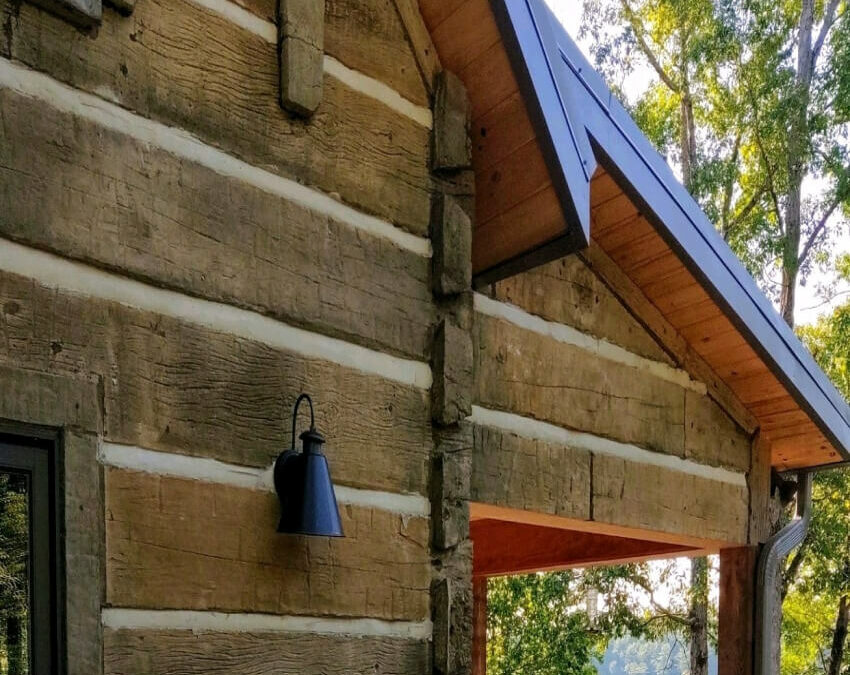Are you considering building a cabin in Asheville? If so, why not explore the option of using concrete as your primary building material? Concrete cabins offer a sturdy and durable solution, blending seamlessly with Asheville’s scenic landscape. In this article, we will delve into the world of concrete cabin construction and explore the various building supplies required for such a project.
Understanding Concrete Cabin Construction
Building a concrete cabin may seem like a daunting task, but once you understand the basics, you’ll be well-equipped to embark on this exciting journey. The process involves creating a solid foundation, erecting concrete walls, and carefully finishing the interior and exterior surfaces.
The Basics of Concrete Cabin Building
The first step in building a concrete cabin is establishing a strong foundation. Typically, this involves pouring a concrete slab or footings to support the weight of the structure. The walls are then constructed using concrete forms, which are filled with a mixture of cement, aggregates, and water. These walls provide excellent insulation and structural integrity.
But let’s dive a little deeper into the process of erecting concrete walls. It’s not just about pouring the mixture into the forms and waiting for it to harden. Skilled craftsmen carefully monitor the curing process to ensure the walls are strong and durable. They pay attention to factors such as temperature, humidity, and the proper ratio of water to cement. This attention to detail ensures that your concrete cabin will stand the test of time.
Once the walls are in place, it’s time to focus on the interior and exterior finishes. From polished concrete floors to textured or painted walls, the possibilities are endless. Concrete offers versatility in design, allowing you to create a cabin that reflects your unique style and taste.
When it comes to interior finishes, you can choose from a variety of options. For a rustic look, exposed concrete walls can add a touch of raw beauty to your living space. Alternatively, you can opt for decorative finishes such as stamped concrete or acid staining to create a more refined and elegant ambiance. The choice is yours, and the possibilities are truly limitless.
Benefits of Using Concrete in Cabin Construction
Concrete cabins offer several advantages over traditional wooden structures. Firstly, they are incredibly durable and resistant to fire, pests, and weather conditions. This means that your cabin will withstand the test of time and require minimal maintenance. You can rest easy knowing that your investment is protected.
Additionally, concrete provides excellent thermal insulation, making your cabin more energy-efficient and reducing heating and cooling costs. The thermal mass of concrete helps regulate indoor temperatures, keeping your cabin cool in the summer and warm in the winter. This not only saves you money but also reduces your carbon footprint.
But the benefits of using concrete in cabin construction go beyond durability and energy efficiency. Concrete is also a sustainable building material. Unlike wood, which requires cutting down trees, concrete can be produced using readily available resources. By choosing concrete for your cabin, you’re making an environmentally friendly choice that aligns with the conservation-minded ethos of Asheville.
So, whether you’re looking to build a cozy weekend getaway or a permanent residence, consider the advantages of concrete cabin construction. With its strength, versatility, and sustainability, a concrete cabin is not only a sound investment but also a beautiful and enduring home.
Essential Building Supplies for Concrete Cabins
Building a concrete cabin requires specific tools and materials. Here, we’ll outline the essential building supplies you’ll need to complete your project successfully.
Tools Needed for Concrete Cabin Construction
- Mixing equipment: A concrete mixer or a wheelbarrow and shovel combination will be essential for preparing the concrete mixture.
- Concrete forms: Forms are used to shape and hold the wet concrete until it cures. They can be made of timber or metal, depending on your preference.
- Trowels and floats: These tools are used for smoothing and finishing the concrete surfaces.
- Concrete saw: A saw is helpful for making precise cuts in the concrete, such as for windows and doors.
- Protective gear: Safety should be a priority, so don’t forget to invest in protective equipment such as goggles, gloves, and masks.
Materials Required for Building a Concrete Cabin
- Cement: The primary binding ingredient in concrete. You’ll need to determine the appropriate amount based on your project’s size.
- Aggregates: These include sand, gravel, or crushed stone, and they provide strength and stability to the concrete mixture.
- Rebar: Reinforcement bars are used to add strength to the concrete walls, preventing cracking and structural issues.
- Waterproofing materials: To protect your cabin from moisture and prevent water damage.
- Insulation: To maintain comfortable temperatures inside your cabin throughout the year.
Sourcing Building Supplies in Asheville
One advantage of building a concrete cabin in Asheville is the availability of local suppliers who specialize in concrete and construction materials. Consider supporting these businesses to strengthen the local economy and reduce the environmental impact of transportation.
Local Suppliers for Concrete and Tools
Asheville boasts several reputable suppliers for all your concrete needs. From large hardware stores to specialty construction companies, you’ll find everything from cement and aggregates to tools and equipment. Some notable local suppliers include “Asheville Concrete Co.” and “Mountain Builders Supply.”
Sustainable Building Supplies in Asheville
If sustainability is a top priority for your project, Asheville offers options for eco-friendly building supplies. Look for suppliers that offer recycled or low-impact materials. For example, “Green Builders Supply” specializes in sustainable construction products that meet high environmental standards.
Cost Analysis of Concrete Cabin Building Supplies
Before beginning your concrete cabin project, it’s essential to establish a budget and understand the costs involved. By accurately estimating and tracking expenses, you can ensure that your project stays on track without unexpected financial burdens.
Budgeting for Your Concrete Cabin Project
When budgeting for a concrete cabin, consider factors such as the size of your cabin, the complexity of the design, and the cost of labor. In addition to building supplies, keep in mind permits, utilities, and any additional construction materials required. Consulting with local contractors or experts can provide valuable insights into estimating expenses accurately.
Saving Money on Building Supplies in Asheville
While concrete cabin construction requires specific materials, there are opportunities to save money without compromising on quality. Consider comparing prices from different suppliers, taking advantage of seasonal sales, or buying building supplies in bulk. Additionally, exploring recycled or reclaimed materials can offer both cost savings and environmental benefits.
Maintenance and Longevity of Concrete Cabins
Concrete cabins are built to last, but proper maintenance is crucial to ensure their longevity and continued aesthetic appeal. Here are some essential tips to keep your concrete cabin in pristine condition.
Ensuring the Durability of Your Concrete Cabin
Regular inspections are essential to identify any signs of wear or damage. Check for cracks, moisture penetration, or any issues that may compromise the structural integrity. Promptly addressing these issues can prevent further damage and costly repairs down the line.
Regular Maintenance Tasks for Concrete Cabins
Maintenance tasks for concrete cabins may include cleaning the exterior surfaces, resealing the concrete, and inspecting the insulation and waterproofing systems. Furthermore, it’s essential to take care of any landscaping around your cabin, ensuring proper drainage to prevent water damage.
In conclusion, building a concrete cabin in Asheville offers a durable, sustainable, and aesthetically pleasing housing option. By understanding the basics of concrete cabin construction and sourcing the right building supplies, you can embark on this exciting journey with confidence. Remember to prioritize proper maintenance to ensure the longevity and beauty of your concrete cabin for years to come.
Discover the Smart Logs Difference for Your Asheville Cabin
Ready to transform your vision of a durable, sustainable, and aesthetically pleasing concrete cabin into reality? Smart Logs of the Carolinas is here to elevate your project with our innovative concrete logs. Experience the charm and warmth of traditional wood logs, combined with the unparalleled durability and low maintenance of concrete. Our logs are not only environmentally friendly and simple to install, but they also come with the added benefits of being fire, insect, and weather resistant. Plus, they’re cost-effective both in installation and insurance. Don’t compromise on quality or character—choose Smart Logs for a superior cabin that stands the test of time. Contact Us! today at 828.781.2015 or email us at info@mysmartlogs.com to start building your dream home with Smart Logs of the Carolinas.

